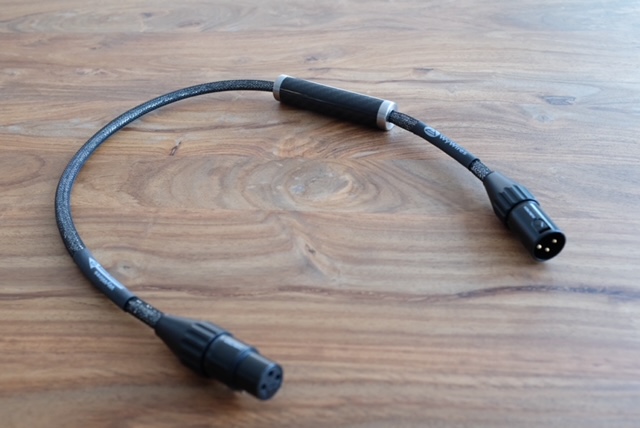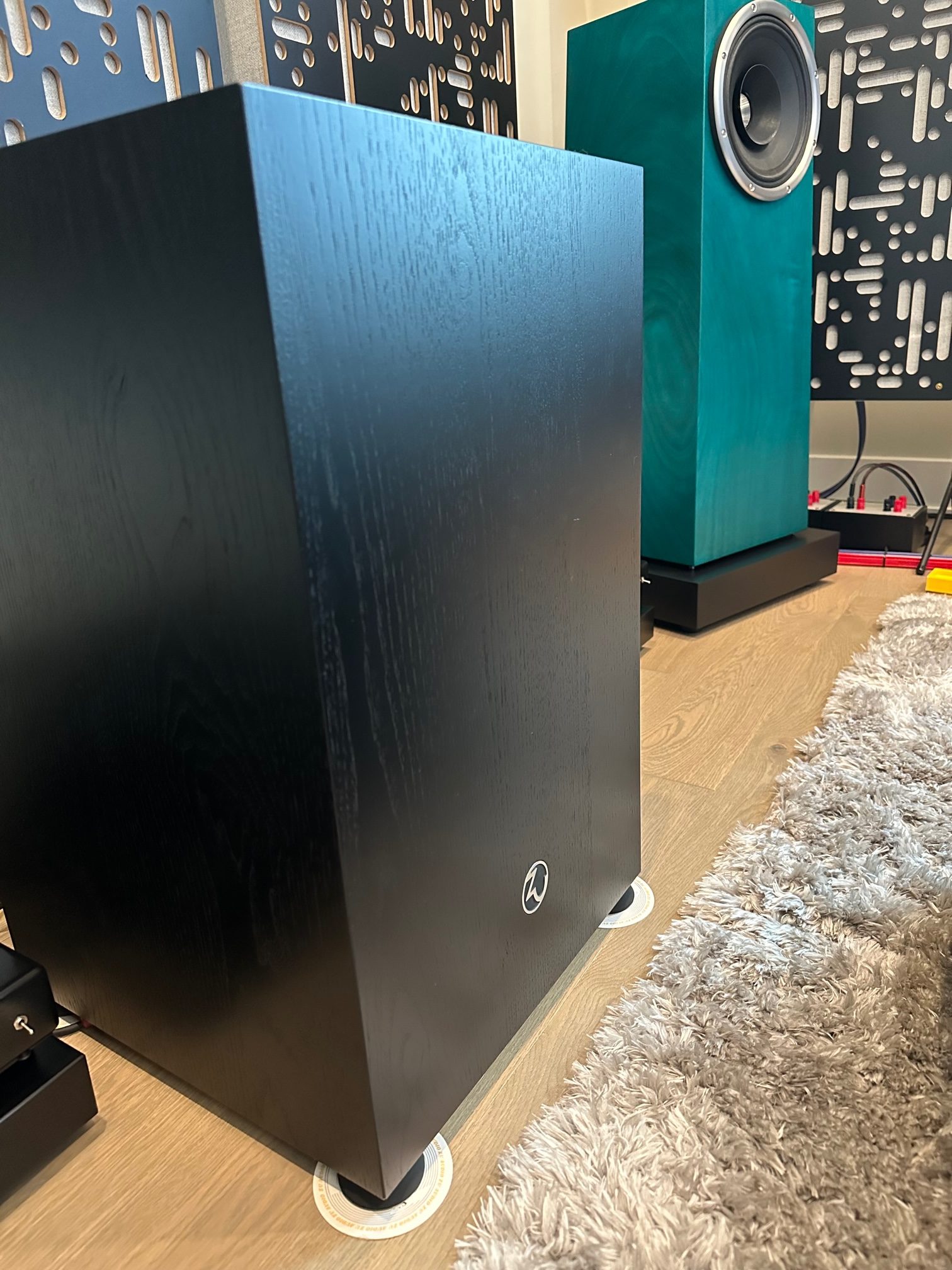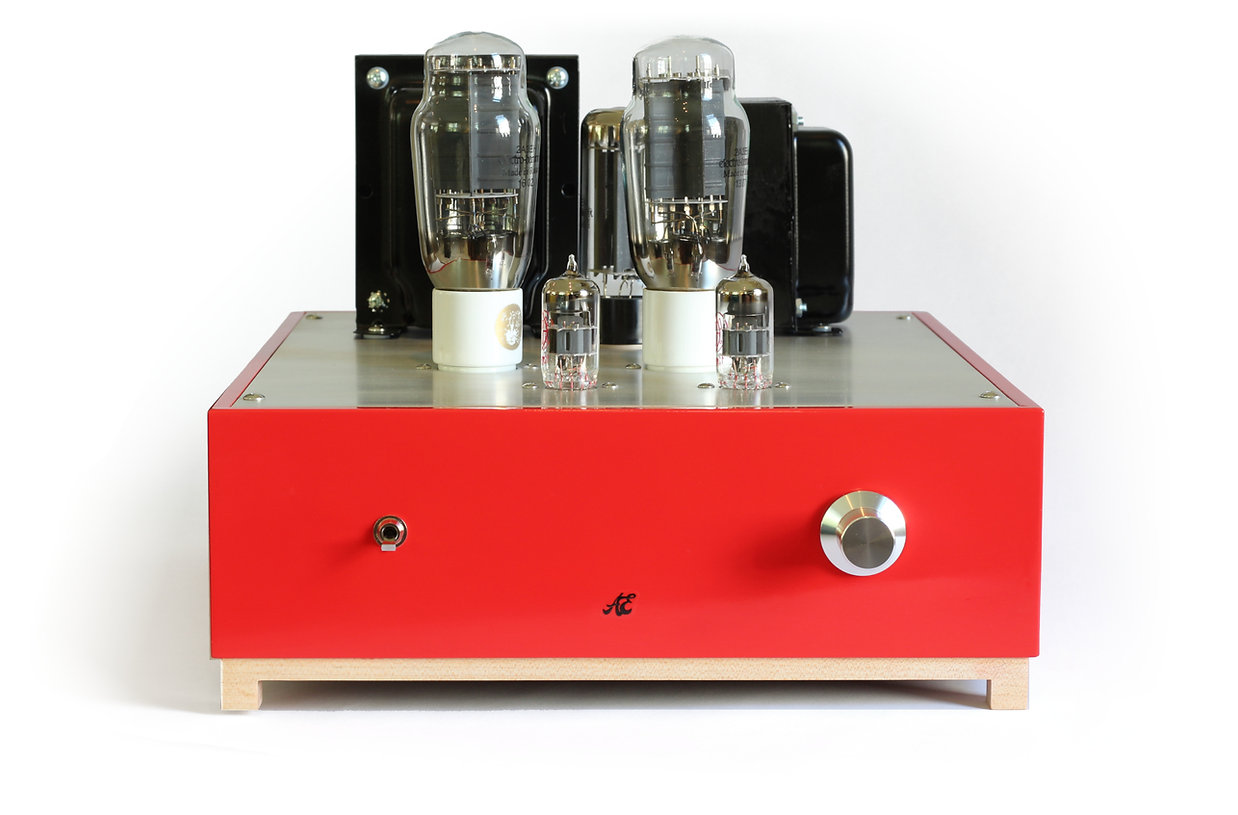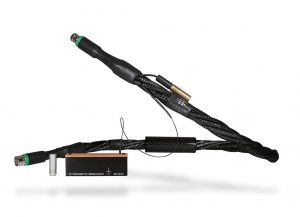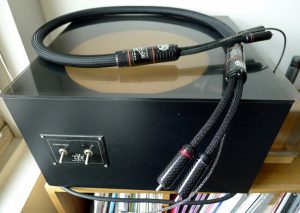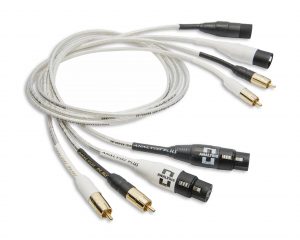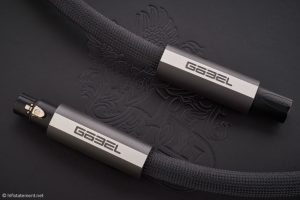Before I start this review I want to make one thing clear, I love WyWires. To be clear the reason I love WyWires is because they have been the only cable brand that I have found that truly enhances my system without any drawbacks. They are not cheap, but the cables act more like components than cables. They seem to provide a level of detail, clarity, and space that you would associate with a cooler sounding system, but they manage to do so while keeping the tone just to the warm side of neutral which is where I really prefer it to be.
For this review I reached out to Alex, the owner of WyWires, and asked if he could send me his phono cable and his digital AES cable. Alex asked if I would be interested reviewing both the Platinum and Diamond versions of these cables. I happily took him up on his offer and a few weeks later all four cables arrived, along with a set of Platinum balanced interconnects that I requested to help connect one of my review components into the system.
What I like about WyWires is that there is technology in them that makes them work and explains why they perform as well as they do. The Platinum phono cables and headphone cables along with the entire Diamond line use a composite material of carbon foam and graphene to absorb high frequency interference and dissipate that energy as heat. This material is commonly used in satellites to protect sensitive electronics from a variety of unwanted interference problems while in orbit. For the Platinum series headphone and phono cables, this material is housed inside an aluminum tube that is used as a heatsink. According to Alex, this material reduces noise by as much as 17dB depending on the frequency.
I have found this material to be very effective on the cables where it is used. I have even had a headphone cable from Alex that allowed me to remove this material from the circuit and the difference was noticeable right away.
The entire Diamond line, even the power cords utilizes this technology. The Diamond Series cables differ from the Platinum in that they use one or more (depending on the exact cable) carbon fiber tubes as the heatsink(s) which is even more effective than metal for this purpose. In addition, the Diamond cables have a completely different wire formulae that is a departure from the other cables in the product line.
I will say that the Diamond cables take everything the Platinum line does well and turns it up a notch.
Let's talk about these Diamond Cables
For those who have read my past WyWires review, I talked a lot about how much I like the build quality of the Platinum cables. They not only look beautiful, but they feel like a high quality expensive product. This review is the first time that I had a chance to see one of Alex's Diamond cables up close and I am happy to report that he really out did himself with the build quality of these cables.
Starting with the look, the use of a black mesh with a silver shielded background creates a surprising amount of depth when you look at the cable itself. It causes the cable to look understated in darker conditions, but shine a light on the cable and it takes on an expensive and luxurious look that I would have expected more in higher end fashion (think bags and couture clothing).
As I said earlier the Diamond cable has a steal and carbon fiber tube, which is used to absorb the heat generated by the high frequency absorption material. The tube provides a really nice finished look to the cable, and also gives the cable an extra little bit of heft. We will talk about how the cable performs, but as far as aesthetics and build quality go the Diamond line of cables is a clear step above the Platinum cables, which is not an easy accomplishment.
How is a Phono Cable different than an RCA Cable?
When you go to WyWires website, and you look at their phono cables, Alex makes it clear to the buyer that the phono cable is different from the standard RCA cable and will perform better for phono applications. However, I wanted to know why and what was special.
The answer to that question appears to be the amount of special high frequency absorbing material applied to the phono cables. The phono cables have a large tube of the stuff applied to them. This is true for both the Platinum cable and the Diamond cable. The idea behind this is that if you can prevent unwanted high frequency noise from getting into the phono preamp you can greatly increase the performance of the system.
Now when possible I like to find ways to measure things like noise suppression, as the results can be hard to compare and which can lead to a very subjective review. It also helps that I live in a city and happen to be surrounded by lots of RF noise which means that cables that are actually effective at blocking external noise are easy to spot.
For this review, I had the Mytek Brooklyn ADC in house, and one nice feature of this ADC is its ability to measure the incoming noise on the line and report it on its front display. I connected my WHEST Audio 40RDT phono preamp using the WyWires balanced interconnects, and my VPI Classic Signature turn table to the WHEST Audio 40RDT using a standard pair of WyWires Platinum Interconnects, and a separate grounding cable. After turning on all the equipment and letting things settle, the noise floor of the phono stage and turn table was an incredibly respectable -69db. This is a noise floor that I think most would consider reference quality for an analog setup especially in an environment with higher then normal RF interference.
I then swapped the standard platinum interconnect between the WHEST Audio 40RDT and the VPI Classic Signature turn table with the Platinum Phono cables. After turning things back on and letting it settle down, the noise floor dropped to -75dB. This was the difference between maxing the volume of my system and hearing a slight (incredibly slight) hiss in my headphones, and hearing nothing. This is a measurable difference between the two cables and in my mind proves that the Phono cables really do more than the standard RCA cables. This alone is enough of a reason for me to buy this cable.
Once again I swapped out the Platinum Phono cables and this time swapped in the Diamond Phono cables. After giving the system time to stabilize I looked at the Brooklyn ADCs screen and I saw the infinity symbol appear. This means the noise floor has dropped below a measurable volume for the Brooklyn ADC (which would mean that it is north of -80dB ). Turning up the volume on the headphone amp confirmed that the analog system was completely silent. Once again I like it when I can prove that something works, and it is even better when the performance tracks along the price tiers.
Listening to the Phono Cables
All listening impressions were done after putting between 100 and 200 hours on each cable.
Starting out with the WyWires Platinum Phono cable, I set my system up so that the phono stage drove my ampsandsound Nautilus directly using the WyWires platinum balanced interconnects to ensure that I had as clean of a signal path as possible.
Dropping the needle on The Who's Quadrophenia I was struck by how quiet the background really was. To be clear the background was never noisy but I was not used to this level of inky black from my analog system. The contrast between that silent background and music caused the dynamic nature of my analog system to take on characteristics that I normally associate with higher-end digital systems. Music organically emerged from the black background, with small nuanced details. Of course, the presentation of was not "digital" but was what you expect from a high-end analog system. The other things that I noticed was the improvement in bass and instrument separation. Bass seemed to be clearer and more detailed. It was hard to put my finger on it, but switching back and forth with the regular Platinum interconnects always ended up with the same conclusion. I even had my wife switch the cables so that the tests were blind and I was consistent with my descriptions after a review of the blind tests. I think this improvement in bass can be attributed to the quieter background.
I then switched over to the Diamond Phono cable, again this cable has gone through the usual 100-200 hours burn-in which is a must for the WyWires cables. Dropping the needle with the Diamond cable took everything that the Platinum cable did and turned it up to a 10. It is hard for me to describe the differences, the best way is to say that things became more realistic and more life-like. I simply stopped listening for things, and instead listened for music.
Trying to figure out how to describe the transformation of my analog system with the Diamond Phono cable was quite challenging. The difference was substantial, but putting your finger on exactly what changed was not a simple task. The cable did not simply increase bass, or treble clarity rather, it seemed to enhance all aspects of the playback experience. The sound stage grew, bass did not increase in quantity, but in clarity, where I felt like I heard more nuances in the bass guitar in the Red Hot Chili Pepper's Stadium Arcadium. Vocals took a leap forward, and switching back to the Platinum Phono cable revealed a slight bit of high frequency noise that I never noticed in the vocal region. This was only noticeable once I heard the same song without it.
As I spent more time listening to the Diamond Phono cable I was left feeling as if I did much more than just make a cable upgrade. It was as if I changed out the cartridge of my phono stage for a newer, better model. To put it in terms of tube rolling, it was as if I changed a nice pair of new production tubes for a top of the line NOS equivalent (which I personally believe makes a substantial difference). The only thing that was a slight shame is I did not have a full set of Diamond interconnects. While there is no way for me to know, I feel like the Platinum balanced interconnects between my phono stage and my amp may have been a limiting factor and therefore I felt like I was only hearing a about 90% of what these cables are capable of (WyWires Platinum cables are no slouch but the Diamond line is clearly a step above). Given the above, I am sure you can see why the rest of my review period was spent with the Diamond Phono cable in the system. It is simply a remarkable cable, and as someone who is budget conscious when it comes to recommending cables, this cable really sent me for a loop on what the value to performance ratio can really be for a cable.
Changing Gears from Digital to Analog
While I have had extensive experience with Alex's analog cables, this was the first time I had a chance to listen to his digital cables. Similar to the above, both the Platinum and Diamond AES cables were burned in for between 100 and 200 hours before critical listening began.
For this setup, I used the AES cables between the Mytek Brooklyn ADC and the Chord Dave, as well as between the Aries G1 and the Chord Dave.
Starting with the Platinum AES cable, I swapped out the standard AES cable I was using between the Brooklyn ADC and the Chord Dave, and put down disk 1, side 1 of the Red Hot Chili Peppers' Stadium Arcadium. Specifically, I wanted to listen to "Slow Cheetah." For those who have not listened to the LP version of "Slow Cheetah" it is a very different song than the digital version that was released on CD and that is available for digital download. I find the difference to be expressed in emotion and drive. To be honest, I simply did not like digital version, I found the song boring and I frequently skipped it. However, it is truly one of my favorite songs on the 4 disk LP because for whatever reason the song simply connects with me in a way it just does not on CD. As a result it has become a very good test bed for the performance of digital gear and ADCs in general. In my review of the Mytek Brooklyn ADC, I found the ADC to be exceptional and to perform incredibly well at converting my analog system to digital with very little loss. The question becomes can it do better with the WyWires AES cables in the mix?
"Slow Cheetah" through the Brooklyn ADC was 90% of what it was directly to the amp from the phono pre. Adding in the Platinum AES cable produces two things that I found to be quite interesting. The first was a great sense of space and what felt like a quieter noise floor. The second was the introduction of a smoother top end that seemed to remove the last few hints of "digital" from the sound of the system. The only cable I have had do similar things was the FTA Callisto USB cable which is still my all time favorite USB cable. The WyWires Platinum AES cable seems to provide a very similar result which makes it incredibly easy to recommend.
When I switched to the Diamond AES cable, it was similar to switching to the Diamond Phono cable, the result was more of a good thing. The sound stage grew again, and the difference between direct analog and the digital loop shrunk to where I was honestly not able to successfully tell the two apart blindly. If the Platinum cable brought "Slow Cheetah" to 95% of its pure analog form, then the Diamond Cable brought it to 98%. That last two percent is likely not the fault of the cable, but instead the inherent loss when converting something from analog to digital. While the Diamond AES cable did not transform the system in the same way that the Diamond Phono cable did, its incremental performance increase in the digital domain was simply exceptional.
Everything I said about both of these AES cables can be said when running them from the Aries G1 to the Chord Dave. Both of these cables helped the all digital chain sound smoother, bigger, and quieter. With the Diamond AES cable providing a substantial improvement in bass clarity and top end smoothness over the already exceptional Platinum AES cable.
Wrapping Up
I come back to the way opened this review, I love WyWires. Alex, the owner of WyWires, makes products that are incredibly easy to recommend because they simply work. I have reviewed a lot of cables, and WyWires has always been a class leader in every cable category I have tested in both performance and value.
I fully recommend both the Platinum and Diamond Phono cables as well as the Platinum and Diamond AES cables, but to different audiences. For people with digital or analog systems that are in the $15k - $25k range, the Platinum cable is well worth the money. You will hear a difference, and you will likely be floored by the performance, especially with the phono cable.
For people with a digital or analog system that has a total retail value of over $25k, it would be well worth auditioning the Diamond cable line from WyWires. The Diamond Phono cable in particular was one of the best sounding upgrades that I have ever put in my system and clearly was worth its $3000 retail price.
I like to follow my own advice, my analog system is very high end, but comes in at about $17k all in. For that reason, and the because I primarily own the Platinum line of cables from WyWires, I have decided that the WyWires Platinum Phono cable will not be leaving my system, along with the balanced Platinum interconnects that Alex sent me as a part of this review.
In the future, probably after a cartridge upgrade, I will be back for the Diamond Phono cable, it really is that good. As for the AES cables they have the exact same recommendation as the Phono cables, if you have a digital system that allows you to use AES cables, go audition the WyWires line. You will not be disappointed, just make sure you wallet is ready because your ears will not let you forget what you heard.
Thank you Alex for allowing me to review these. What you are doing with cables is incredible and I look forward to having the privilege of writing more about your work in the future.
Review System
- Digital Source: Aries G1, Chord Dave
- Record Player: VPI Classic Signature, Fat Boy Gimbal Tone Arm, AT- OC9XSL cartridge
- Phono Stage: WHEST Audio 40RDT
- Amplifier: ampsandsound Nautilus
- Headphones: Hifiman Susvara
- Speakers: Custom Built Horn Loaded Monitors
- Cabling: WyWires Platinum Interconnects and Power Cords
- Power Conditioning: PS Audio P12
WyWires Platinum Phono Cable
Retail: $1899
WyWires Diamond Phono Cable
Retail: $2999
WyWires Platinum AES Cable (4ft)
Retail: $899
WyWires Diamond AES Cable (4ft)
Retail: $1699
WyWires









